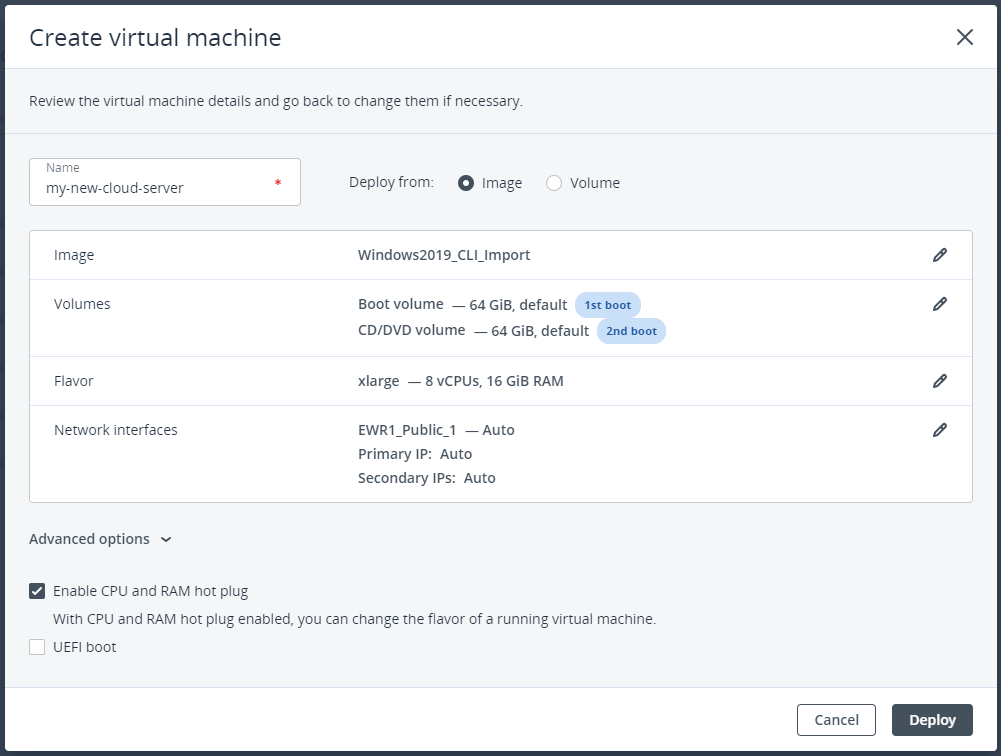What is a cloud server and how does it work?

Cloud servers are the quickest, easiest, and most cost-effective way to deploy application hosting infrastructure. With the ServerMania Cloud, select your virtual machine name, choose an operating system, and click ‘Deploy’. A few seconds later, the cloud server is running and ready to host your software and hardware tools!

The cloud experience is intuitive and user-friendly, but, as you might imagine, users only see the various cloud service providers. Behind the simple, secure, and reliable cloud service is a complex array of hardware, infrastructure, and software.
In this article, we will take a closer look at what a cloud server is and take a peek behind the curtain to help you understand cloud computing services, how cloud servers work, and what happens when you launch a new server on the ServerMania Cloud. We compare cloud and dedicated servers and help you identify when to use them, including some of their benefits.
What is a Cloud Server?
A cloud server is a virtual machine running on a cloud hosting platform. Each cloud server is a software construct created using features of the host operating system and virtualization software called a hypervisor. As a cloud hosting customer, you don’t have to manage the server equipment or the underlying physical machine, its software, operating systems, or the hypervisor; the hosting provider takes care of that.
See also: Bare Metal vs. Hypervisor: Which Is Right For Your Project?
To the server’s user, a cloud server behaves just as a physical cloud server, like a physical—or bare metal—server. It has memory, storage, and processors. It runs a Linux or Microsoft Windows operating system and all the software available on those platforms. The virtual machine is mainly managed by users remotely via the cloud UI, also known as a control panel.
Because it is a virtual machine, a cloud server has properties that a physical server does not. The various computing resources available to a cloud server can be accessed remotely and modified in seconds from a cloud control panel—to increase processing power or decrease memory or storage, for example. Cloud servers can be launched, cloned or discarded in seconds.
Cloud servers are made up of ones and zeroes, not silicon and wire so they can be deployed according to templates written in code, migrated between physical and virtual servers anywhere, and duplicated. Unlike physical servers, cloud servers are controlled through APIs and software, allowing users to manage their servers as easily in code as in the control panel.
How Do Cloud Servers and Cloud Platforms Work?
The physical server and the hypervisor are the two fundamental components that support a cloud hosting platform.
- The physical server — A powerful computer housed in a remote data center, essentially identical to the machines used in dedicated server hosting or colocation. The physical server has an operating system, the host OS, which might be a variant of a standard OS, or a specialized operating system, purpose-built for hosting cloud platforms. A cloud platform typically uses many physical servers, joined together by the cloud management layer into a unified pool of resources.
- The hypervisor — Software that runs on the physical server and divides resources between numerous virtual machines while mediating communication between the VMs and the underlying hardware. The hypervisor simulates multiple cloud servers and ensures that it’s impossible for users to “break out” of their cloud server to access data stored on other cloud servers or the host machine.
These two components allow you to run multiple virtual servers and machines together. Still, this user-friendly and reliable hyperconverged Infrastructure as a Service (IaaS) cloud platform needs additional cloud management software. This is the most important of orchestration software.
Orchestration software automates tasks such as provisioning cloud servers, managing network connections, resizing virtual machines and storage, using virtual private servers, and other functions that transform a collection of servers into a trustworthy cloud platform. Orchestration software allows users to click a button in a web app and have a fully functional cloud server at their disposal seconds later.
Cloud management software handles other essential aspects of the whole cloud environment too. It is responsible for cloud server failover. When a physical server fails or has resource limitations, the management software can immediately migrate the load to a different server. Other tasks handled by management software include backups, security and access management, billing, and the interface you use to control your private cloud servers yourself.
We built the ServerMania Cloud using cutting edge cloud management software and world-class data center infrastructure. Together they provide incredibly reliable, cost-effective, and secure public and private clouds, cloud data storage, and hosting solutions.
Dedicated Servers vs. Cloud Servers
Dedicated and Cloud servers are complementary technologies. For many use cases, a cloud server is a sound choice, including those where you might have previously chosen a dedicated server.
The benefits of choosing a cloud server include the following key features:
- On-demand resources — Cloud servers are deployed instantly and can be shut down just as quickly.
- Post-payment — Cloud users pay only for the resources their virtual machines consume, for which they are billed at the end of each month. In contrast, dedicated servers are paid for up-front.
- Elasticity — Cloud servers can grow and shrink depending on real-world needs.
- Automation — Cloud servers can be deployed automatically according to predetermined templates, significantly reducing configuration and management time.
Despite the enormous benefits of the cloud, dedicated servers have a role to play in an ultra high-performance computing environment. They are ideal for workloads that require extreme number-crunching and other scenarios where performance is prioritized over scalability and cost. Dedicated servers remain the most potent single-server hosting platform available for these use cases.
Conclusion
For most use cases, choosing a top cloud provider with the most cost-effective, scalable, and easy-to-manage hosting solution is a savvy choice. Cloud providers and virtual machines are ideal for CMS and ecommerce hosting, application hosting, data storage, email hosting, and many other common hosting scenarios.
Learn more about the ServerMania Cloud and deploy your first virtual machine today.
Was this page helpful?

